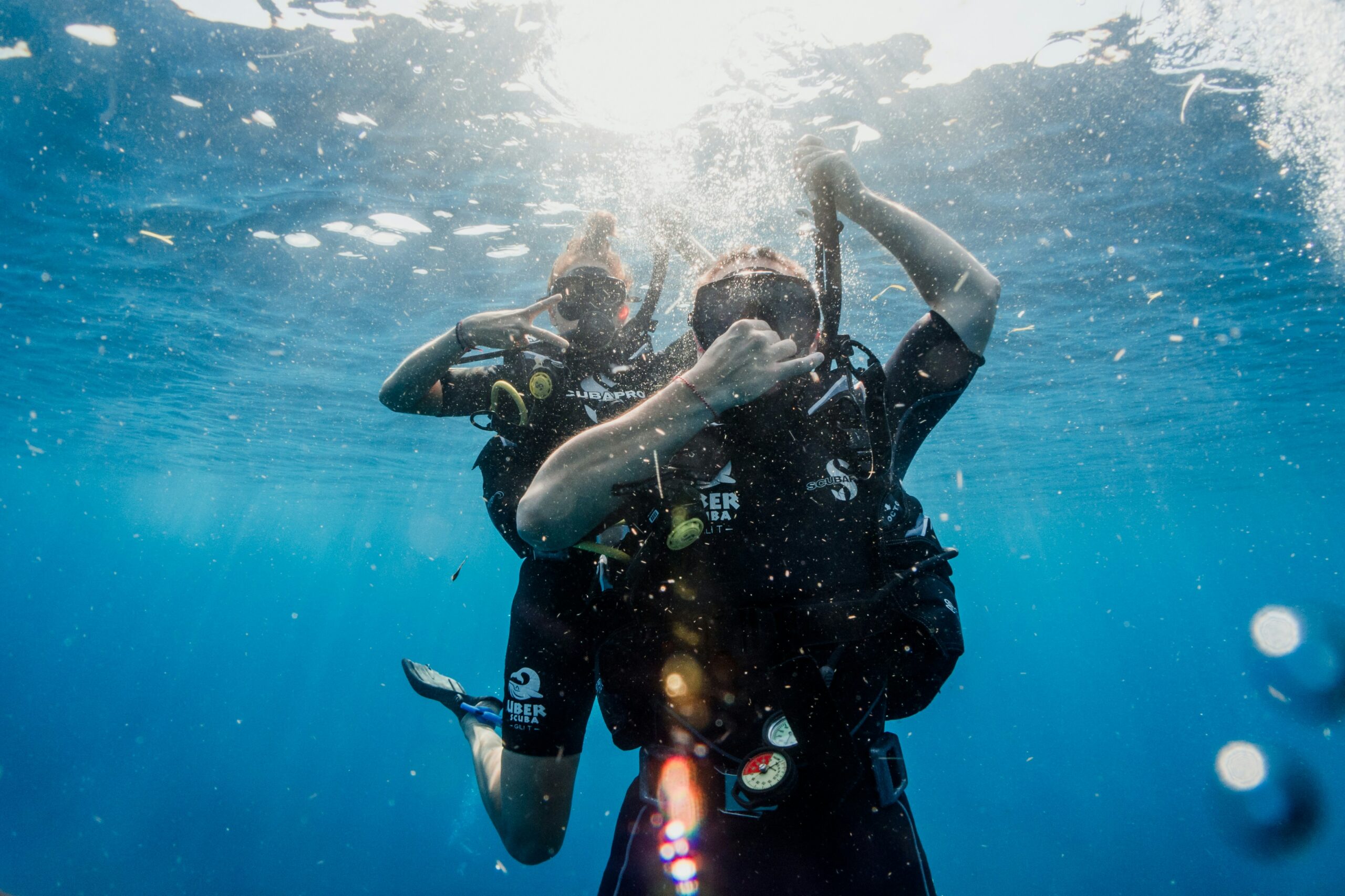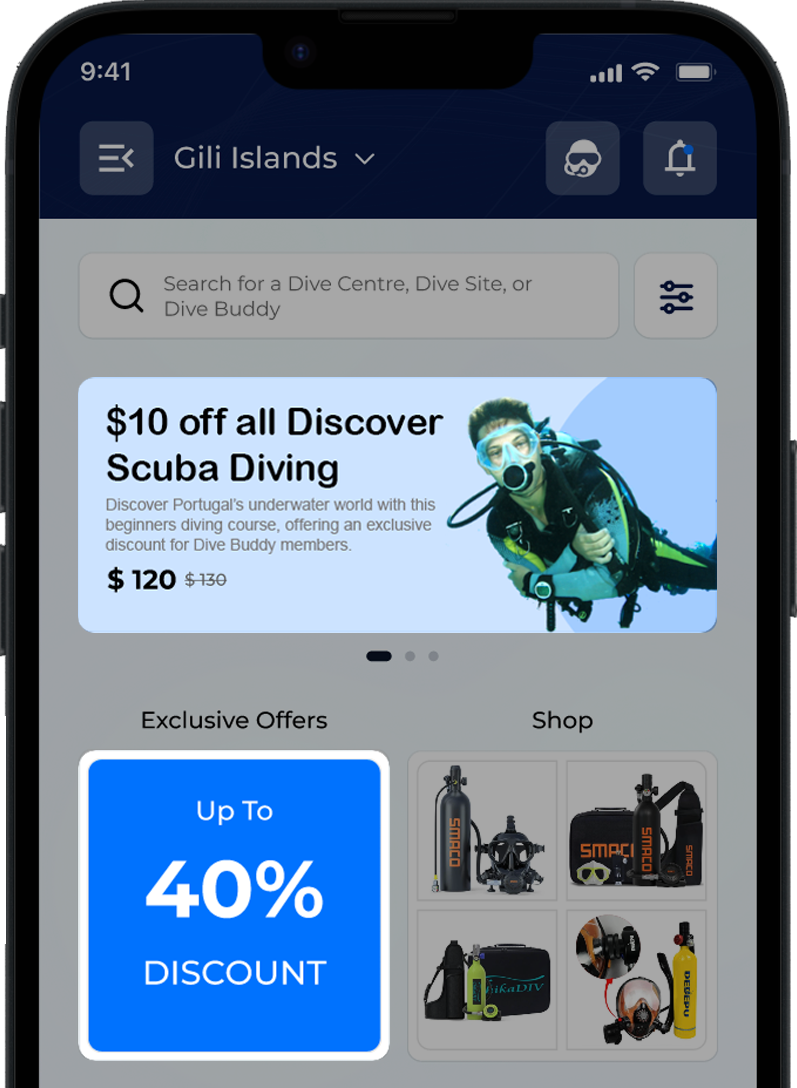
If you’re doing an introductory dive (like a “Discover Scuba Diving” course), here’s a breakdown of how your experience will go:
1. Pre-Dive Paperwork and Health Check
When you arrive at the dive centre, you’ll need to complete some essential paperwork. This usually includes:
• Medical Questionnaire: Certain medical conditions (like asthma or heart problems) may require a doctor’s clearance before diving.
• Liability Waiver: Diving has inherent risks, so you’ll be asked to sign a waiver acknowledging them.
Tip: Be honest on the medical form. Your instructor needs to know about any health issues to keep you safe.
2. Dive Briefing and Safety Talk
Once the paperwork is done, you’ll have a pre-dive briefing led by your dive instructor. They’ll explain:
• How the dive will be structured (where you’ll go and what you’ll do)
• What equipment you’ll use (like your mask, fins, BCD, regulator, and air tank)
• Hand signals used to communicate underwater (like “OK” and “Ascend”)
• Basic safety rules (like never holding your breath while diving)
If you’re feeling unsure about anything, ask questions now. The dive instructors are there to make you feel comfortable and safe.
3. Getting Fitted for Your Gear
Next, you’ll be fitted with your scuba gear. This includes:
• Wetsuit or Drysuit (depending on water temperature)
• Buoyancy Control Device (BCD) (a jacket that helps you float or sink)
• Regulator and Air Tank (what you’ll breathe from)
• Mask and Snorkel (so you can see clearly underwater)
• Fins (to help you move efficiently underwater)
Tip: If something feels uncomfortable (like a mask that’s too tight), tell the instructor. Comfort is key for a great dive experience.
4. Learning the Basics in Shallow Water
Before heading to deeper water, you’ll practice a few essential skills in shallow water (like a pool or a calm, shallow bay). These skills may include:
• Clearing your mask (if water gets inside)
• Regulator recovery (what to do if it comes out of your mouth)
• Breathing techniques (slow, controlled breathing is essential)
Don’t worry — you won’t be rushed. Your instructor will ensure you feel comfortable before moving on.
5. The Big Moment: Your First Dive
Now for the part you’ve been waiting for — your first dive! You’ll gradually descend with your instructor by your side. They’ll check on you constantly to ensure you’re comfortable.
Here’s what to expect:
• Weightlessness: It feels like flying underwater! With proper buoyancy, you’ll “hover” effortlessly.
• Breathing Feels Different: It may feel strange to breathe through a regulator at first, but you’ll quickly get used to it.
• Stunning Views: You’ll see fish, coral, and marine life up close like never before.
You won’t go very deep on your first dive (usually around 6-12 metres (20-40 feet)). This depth is perfect for seeing marine life while staying safe.
6. The Ascent and Debrief
After exploring the underwater world, it’s time to ascend slowly and safely. Your instructor will guide you to the surface and ensure you’re OK.
Once you’re back on land (or the boat), you’ll have a debrief with your instructor. You’ll discuss how the dive went, review any challenges, and maybe even share photos or videos from your adventure.
Want to make sure you’re ready for your first dive? Here’s how to prepare in advance:
1. Get Comfortable in Water
While you don’t need to be a champion swimmer, being comfortable in water will help you feel more at ease. Practice floating, treading water, and breathing through a snorkel.
2. Learn Basic Hand Signals
Hand signals are the only way to “talk” underwater. The most important signals to remember are:
• “OK” (hand forming an “O” with pointer finger and thumb)
• “Problem” (flat hand, palm down, tilting side-to-side)
• “Ascend” (thumbs up — NOT a “good job” sign in diving)
3. Know How to Equalise Your Ears
When you descend, pressure increases, and you’ll need to “pop” your ears. The most common method is the Valsalva Manoeuver (pinch your nose and blow gently). Your instructor will show you how.
4. Stay Calm and Breathe Slowly
If you feel nervous, focus on slow, deep breaths. Breathing slowly helps reduce anxiety and conserves air. Remember, your instructor is right there with you at all times.
5. Get a Good Night’s Sleep
Diving requires focus and calm, so rest well the night before. Being tired or hungover can increase anxiety and reduce your ability to stay calm underwater.
6. Wear the Right Clothes
Wear a bathing suit and bring a towel. You’ll be wearing a wetsuit over your swimsuit, so pick something comfortable.
Tips to Make Your First Dive Amazing:
1. Trust Your Instructor – They’re trained to keep you safe.
2. Don’t Rush – If you feel unsure, ask for more time in shallow water.
3. Focus on Breathing – It’s easy to get distracted by marine life, but slow breathing helps you stay calm and use less air.
4. Take It All In – Your first dive is unforgettable. Look around, watch the fish, and enjoy every moment.
The underwater world is unlike anything you’ve seen before. Depending on where you dive, you might encounter:
• Tropical Fish (clownfish, parrotfish, butterflyfish)
• Coral Reefs (like colourful brain coral and fan coral)
• Crustaceans (like crabs, shrimp, and lobsters)
• Marine Plants (like seaweed, seagrass, and kelp)
If you’re lucky, you may spot sea turtles, octopuses, or even a stingray.
Your first scuba dive is a life-changing experience. While it’s natural to feel nervous, remember that you’ll be under the guidance of a professional instructor. They’ll ensure you’re comfortable, safe, and ready to explore the underwater world.
If you’re still feeling unsure, why not visit your local dive centre and ask for a trial session in a pool? It’s a great way to practice breathing underwater and get a feel for the experience.
If you’re ready to take the plunge, find a trusted dive centre and book your first dive with Dive Buddy. Dive Buddy makes it easy to find reputable dive centres and book dives with no hidden booking fees. Plus, you can check real-time dive site conditions and discover exclusive offers from major diving brands.
Want more scuba diving tips and guides? Explore our blog for diving advice, gear reviews, and inspiration for your next adventure.
Your first dive is just the beginning of a lifelong adventure. Dive in — and discover the world beneath the waves!
and join the waitlist for FREE lifetime access plus your limited edition membership card!
Access Deals from Top Brands Only For Dive Buddy Members

Partner with Dive Buddy and add offer exclusive offers on products and services, only for Dive Buddy members.

Join the waitlist
Join the Dive Buddy waitlist to be notified when the app is ready to download. By joining now you will receive FREE Lifetime Access and a Limited Edition Membership Card!